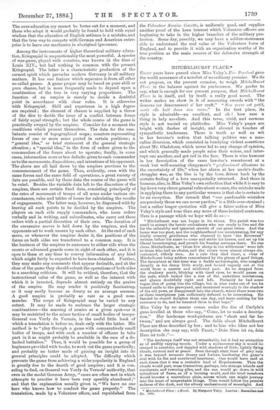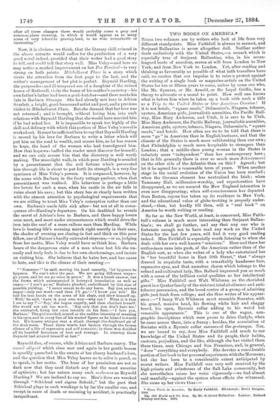AIITCHELHURST PLACE.* EIGIIT years have passed since Miss Veley's For
Percival gave the world assurance of a novelist of no ordinary promise. We do not propose, on the present occasion, to weigh Mitchelhurst Place in the balance against its predecessor. We prefer to say, what is enough for our present purpose, that Mitchelhurst Place is in itself, and by itself, a really good novel. The writer makes no show in it of measuring swords with " the deacons (or deaconesses) o' her craft." " Son verve eat petit, mais elle bolt dans son verve." In the first place, its style is admirable—an excellent, and oh ! how rare a thing in lady novelists. And this terse, vivid, and nervous style is not wasted on platitudes. Miss Veley's pages are bright with flashes of insight, and abound in touches of sympathetic tenderness. There is truth as well as wit in her heroine's notion that talking politics was a mas- culine diversion, which consisted in bandying violent assertions about 'Mr. Gladstone, which never led to any change of opinion, and which generally made people raise their voices, and inter- rupt one another, and get red in the face. There is wise humour in her description of the same heroine's resentment at a weak but well-meaning clergyman's "professional allusioni to the uncertainty of life," when her alarm at her uncle's death- struggles was, as the Dee is by the bore, driven back by the ecstatic feeling of a love unexpectedly returned. And there is humour, also, in Miss Veley's own reflection that while it is easy to lay down very clever general rules about women, the mistake made in applying them to any particular woman is that she is certain to be an exception. Her remark that " our pardonable mistakes are precisely those we can never pardon," is a little over-strained ; but a rather longer quotation will give a fairer notion of Miss Veley's style and tone than any more of these isolated sentences. Here is a passage which we hope will do so :—
" Mitchelhurst was not happy in its vicars. The parish was too small to attract the heroic enthusiasts who are ready to live and die for the unhealthy and ignorant crowds of our great cities. And the house was too poor, and the neighbourhood too uninteresting, for any kindly country gentleman who chanced to have ` the Reverend' written before his name to come and stable his horses, and set up his liberal housekeeping, and preach his Sunday sermons there. No one chose Mitchelhurst, so ` those few sheep in the wilderness' were left to those who had no choice, and the vicars were almost always dis- contented, elderly men. As a rule they died there, a vicar of Mitchelhurst being seldom remembered by the givers of good livings. The incumbent at this time was a feeble archaeologist, who coughed drearily in his damp little study, and looked vaguely out at the world from a narrow and mildewed past. As he stepped from the shadowy porch, blinking with tired eyes, he would pause on the path, which looked like a row of flat, unwritten tombstones, and glance doubtfully right and left. Probably he had some vague idea of going into the village, but in nine eases out of ten he turned aside to the graveyard, and sauntered musingly in the shadow of the old yews, or disappeared into the church, where there were two or three inscriptions just sufficiently defaced to be interesting. He fancied he should decipher them one day, and leave nothing for his successor to do, and he haunted them in that hope."
Miss Veley by no means comes under the fire of Carlyle's guns levelled at those who say, " Come, let us make a descrip- tion." Her landscape word-pictures are "short and far be- tween," and are always good. The fields about Mitchelhurst Place are thus described by her ; and to him who likes not her description she may say, with Faust, " Dein Sinn ist za, deb
Herz ist todt :"—
" The landscape itself was not remarkable, but it had an attraction as of swiftly varying moods. Under a midsummer sky it would lie steeped in sunshine, and dappled with shadows of little, lightly-flying clouds, content and at peace. Seen through slant lines of grey rain it was beyond measure dreary and forlorn, burdening the gazer's soul with its flat and unrelieved heaviness. One would have said at. such times that it was a veritable land of Hopelessness. Then the clouds would part, mass themselves, perhaps, into strange islands and continents, and towering piles, and the sun would go down in wild splendours of flame, as of a burning world, and the level meadows would become a marvellous plain, across which one might journey into the heart of unspeakable things. Then would follow the pensive sadness of the dusk, and the silvery enchantment of moonlight. And • Mitchelhurst _Place : a Morel. By Margaret Paley. London : Maemillsavatil Co. 1884.
after all these changes there would probably come a grey and common-place morning, in which it would appear as so many acres of very tolerable grazing-land, in no wise remarkable or interesting."
Now, it is obvious, we think, that the literary skill evinced in the above extracts would suffice for the production of a very good novel indeed, provided that their writer had a good story to tell, and could tell that story well. Miss Veley—and here we
may notice a marked improvement on her For Percival—is very strong on both points. Mitchelhurst Place is a story which rivets the attention from the first page to the last, and the writer's management of her plot is perfect. Reynold Harding, the purposeless and ill-tempered son of a daughter of the ruined house of Roth well, visits the home of his mother's ancestry—his own father's father had been a pork-butcher--and there meets his fate in Barbara Strange. She had already met hers in Adrian
Scarlett, a bright, good-humoured artist and poet, and a previous visitor to Mitchelhurst Place. But she deemed that her love was not returned ; and is brought, without loving him, into such relations with Reynold Harding that she would have married him if he bad asked her. It is impossible to speak too highly of the skill and delicacy with which this portion of Miss Veley's novel is worked out. It must be sufficient here to say that Reynold Harding is moved by his love for Barbara to write a letter which will
put him on the road to wealth, and secure him, as he has reason to hope, the hand of the woman who had transfigured him. How that hope was baffled the reader must discover for himself; and we can only assure him that the discovery is well worth making. The moonlight walk, in which poor Harding is assailed by a presentiment that the evil fortune which persecuted
him through life is about to put forth its strength, is a very fine specimen of Miss Veley's powers. It is surpassed, however, by the scene with Barbara in the fusty cottage parlour, when that presentiment was realised. His behaviour is perhaps a little too heroic for such a man, when his castle in the air falls in ruins about his ears ; but this story has so clearly been written with the utmost attention to psychological requirements that we are willing to trust Miss Veley's conception rather than our own. Barbara's uncle falls sick after—but not at all in conse- quence of—Harding's departure. On his deathbed he reveals the secret of Adrian's love to Barbara, and these happy lovers soon meet, and meet under circumstances which would drive the iron into the soul of a more callous man than Harding. While love is beating life's morning march right merrily in their ears, the shades of evening are closing-in fast and thick on this poor fellow, one of Nature's hardly-entreated stepsons,—or so, judging from her motto, Miss Veley would have us think him. Barbara hears of the dangerous state of a man whose lost life she un- easily and truly feels is due to her own shortcomings, and insists on visiting him. She believes that he hates her, and has cause to hate, and this is the climax of their meeting :—
" Nonsense !' be said, moving his head uneasily, let bygones be bygones. We can't alter the past. We are going different ways— go yours, and let me go mine in peace.' It was a harsh answer, but the frown which accompanied it betrayed irresolution as well as anger.—` I can't go so,' Barbara pleaded, emboldened by this sign of possible yielding. 'I never meant to do any harm. Say you are not angry—only one word—and then I'll go.'—'I know you will.' He laid his lean hands on the arms of his chair, and drew himself up. Well,' be said, have it your own way—why not ? What is it that I am to say ?'—' Say,' she began eagerly, and then checked herself. She would not ask too much. Say only that you don't hate me,' she entreated, fixing her eyes intently on his face.—` I love you, Barbara.' The girl recoiled, scared at the sadden intensity of meaning in his eyes, and in every line of his wasted figure as ho leaned towards her. His hoarse whisper sent a shock through the deadened air of the drab room. Those three words had broken through the frozen silence of a life of repression and self-restraint; in them was distilled all its boarded fierceness of love and revenge. In uttering them Reynold had uttgred himself at last."
Reynold dies, of course, while Adrian and Barbara marry. The amari aliquid which rises now and again in her gentle bosom is speedily quenched in the sweets of her cheery husband's love, and the question that Miss Veley leaves us to solve is posed, so to speak, in her motto. The hues of her pessimism are not so dark now that they need disturb any but the most anserine of optimists ; but has nature many such malvenus as Reynold Harding ? We are inclined to say no. Men's lives are wrecked through " Schicksal and eigene Sebald ;" but the part that Schicksal plays in such wreckage is by far the smaller one, and
except in cases of death or maiming by accident, is practically insignificant.



































 Previous page
Previous page